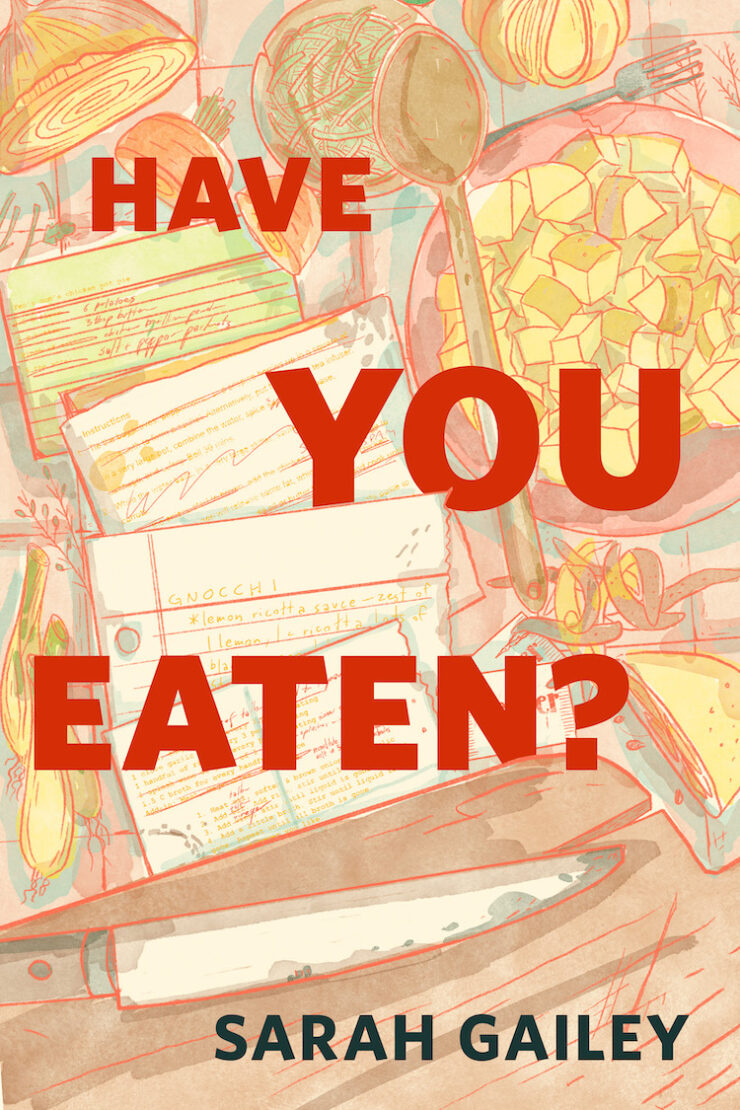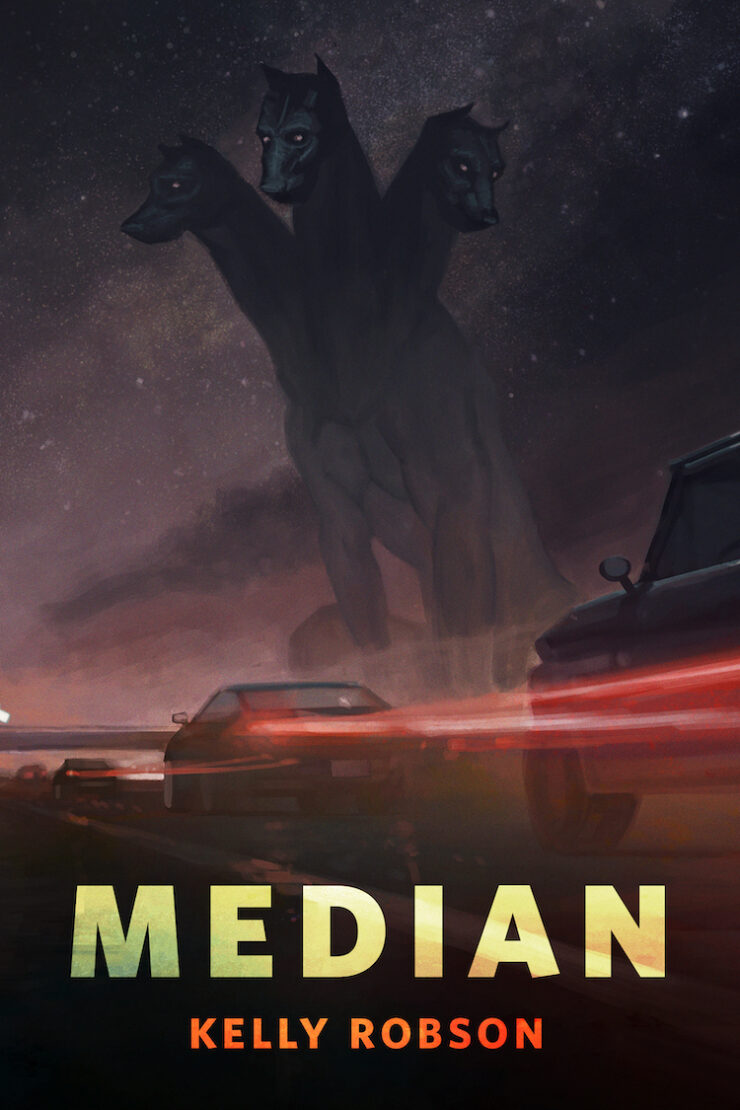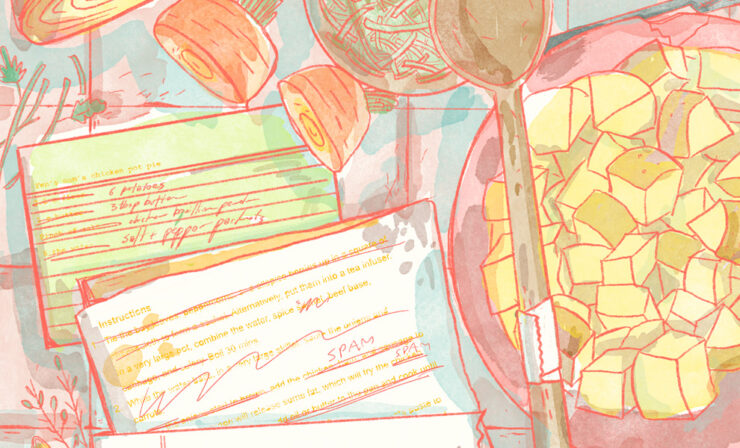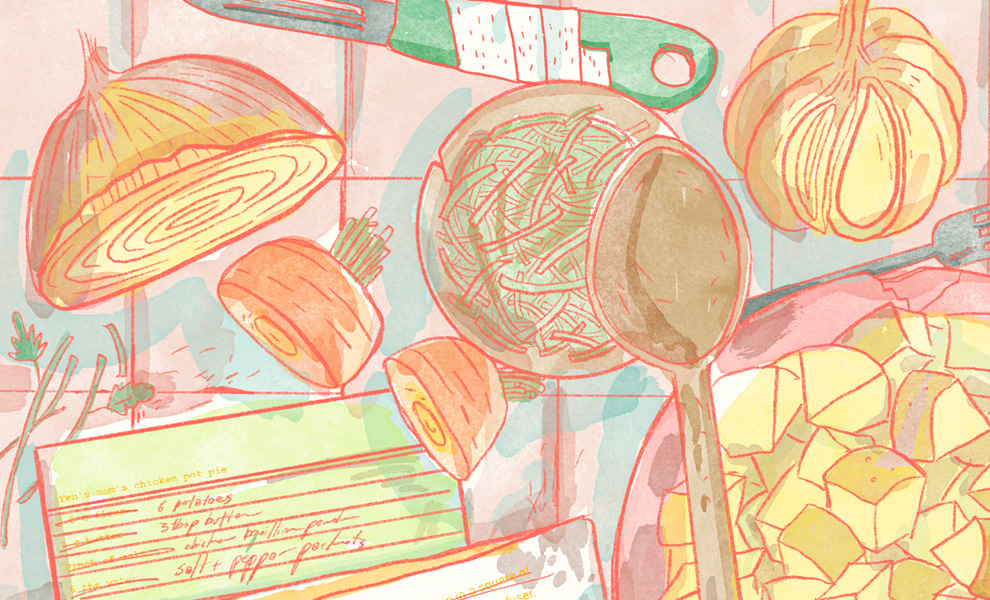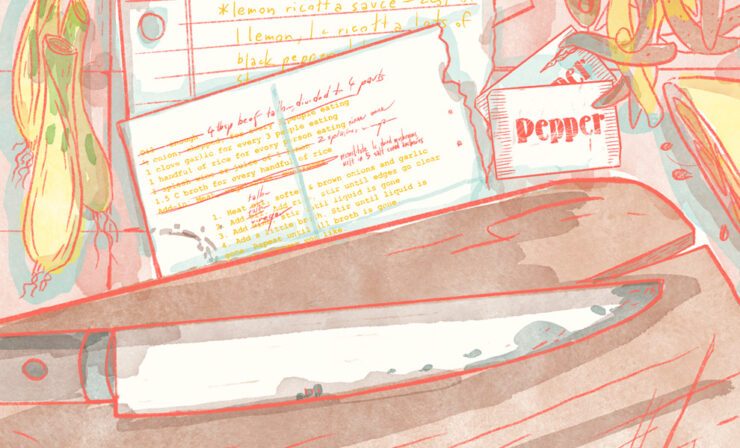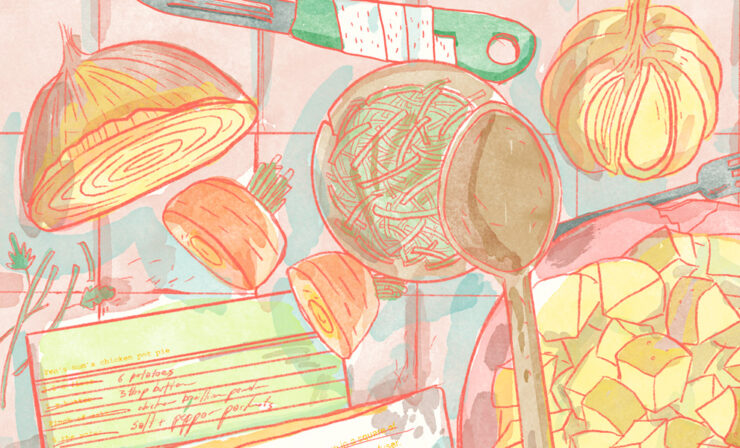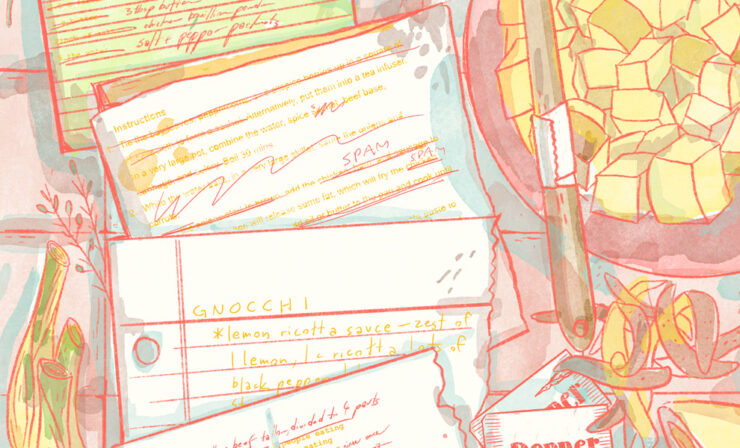In a new serialized novella from Hugo Award-winning author Sarah Gailey, a fractured group of undesirables work together to nurture and nourish each other while navigating a dangerous world that would just as soon see them dead. Still—inch by inch, meal by meal—they build their own future. Have you eaten?
Fen’s Dad’s Soup
2 bay leaves
6–8 peppercorns
3–5 allspice berries
10 cups water; or 10 cups beef broth & omit bouillon
4 tablespoons beef base or 2 bouillon cubes
½ head cabbage, shredded
1 cup celery, chopped
2 onions, chopped
2 carrots, chopped
1 pound sliced sausage
2 chicken breasts, cubed
1 cup ham, cubed
1 6-ounce can tomato paste
1 cup dry white wine
3 large dill pickles, chopped
2 tablespoons capers
¾ cup black olives, sliced
2 cans stewed tomatoes
Salt
Pepper
Optional: Dill and sour cream.
Instructions
- Tie the bay leaves, peppercorns, and allspice berries up in a square of cheesecloth to form a sachet. Alternatively, put them into a tea infuser. In a very large pot, combine the water, spice sachet, beef base, cabbage, and celery. Boil for 30 minutes.
- While the water boils, in a very large skillet, sauté the onions and carrots.
- When the onions start to brown, add the sausage, chicken, and ham to the pan. The sausage will release some fat, which will fry the chicken and ham. If omitting sausage, add oil or butter to the pan and cook until the chicken and ham are brown on all sides.
- Add the contents of the skillet to the cooking pot. Add tomato paste to the skillet and stir until it starts to brown; then, add the white wine and dill pickles to the skillet. Stir to loosen all fond from the bottom of the pan, then transfer contents of the skillet to the cooking pot.
- Add capers, olives, and stewed tomatoes to the cooking pot. Simmer 5–10 minutes until heated through.
- Add salt and pepper to taste. Serve with dill and sour cream.
Iowa is quiet at night, not that anyone in the back of the pickup would know. The engine is so loud that they can barely hear their own thoughts. But that’s fine, because none of them particularly want to tune in to that frequency anyway. The noise is a mercy, in its way.
All four of them—Fen, Quan, Harper, and Morrow—are wedged into the space next to the strapped-tight ATV in the truck bed. They’ve been rattling around back there like coins in a can since the middle of Colorado, where they managed to get picked up for the clearance price of all the pills in Morrow’s pockets. The guy driving the truck didn’t even look at their faces before opening the tailgate and ushering them in. He didn’t look when he slammed the tailgate shut either. Fen was lucky not to lose a finger.
That unlooking was its own kind of courtesy—the gift of anonymity, generously granted to four nobodies in exchange for a palmful of loose capsules.
“Quan. Hey. Hey, Quan.” Morrow is folded nearly in half to fit in their corner of the truck bed, closest to the cab. They’re nudging a zoned-out Quan with one sharp elbow.
“Wha?” Quan sounds disoriented, like he’s just woken up.
Morrow bends down to lean close to Quan’s ear. “What did I give that guy?”
“What did you—do you mean the pills?”
“Yeah, I didn’t check. Did you see what I handed him?”
Quan leans away, gives Morrow an incredulous look. “No. How do you not know what pills were in your pocket?”
Morrow shrugs, leans around Quan to try to get Harper’s attention. “Harp?”
Harper shakes their head, points to their ear. Even if they were open to conversation, which they usually aren’t, the thunder of the truck’s engine is loud enough to wash out any possibility of conversation.
Morrow doesn’t bother trying to get Fen’s attention. She’s crammed tight into the opposite corner from them. Her back is against the tailgate, and a scarf is up over her face to filter the worst of the exhaust coming from the tailpipe beneath her seat. Her eyes are closed and her skin is a worrying shade of green.
Just as Quan’s eyes start glazing over again, the truck slows. The stink of exhaust thickens without the wind of movement to whisk it away. Harper and Morrow pull their shirts up over their noses and mouths; Quan just coughs.
There’s nothing here to stop for, but the truck pulls onto the shoulder anyway. The semiautomatic bleat of the rumble strip jolts them all alert. They glance at each other, worry passing between them as fast as an extreme heat warning pinging every palmset in a hundred-mile area. None of them know why the driver would choose to stop in this lonely place.
The engine cuts off. Wildflowers grow next to the highway, bottle caps scattered in the dirt they’re growing out of. The golden pre-dusk light makes the broken glass on the highway shoulder glow. A fallow field stretches as far as any of them can see; on the other side of the highway, a blanket of soybeans extends all the way to the horizon. A door opens, then slams shut again. A lone cicada whines nearby; other than that, there’s no sound louder than footsteps on gravel as the driver makes his way around the side of the truck.
The tailgate drops open. Fen nearly falls out but catches herself just in time. She drops her head into her hands and sits there, catching her breath.
The driver’s hat, a faded blue ballcap with a dark rectangle on the front where a patch has been ripped off, shades his face so his eyes aren’t visible. He clears his throat and spits into the wildflowers. “You’ll want to get out and walk from here,” he says. “State line’s in a couple miles, and the State Border Patrol in Illinois started doing agricultural inspections on all vehicles entering the state last year. Depending who’s running the booth, could mean trouble for some kinds of people.”
“We’re trying to get to Chicago,” Harper says as they scramble past Fen and out of the truck bed. It’s a five-foot drop to the ground. The driver doesn’t help them down.
Morrow nudges Quan again. “That’s in Illinois, right?” they whisper.
Quan doesn’t answer. He pauses at the edge of the tailgate, looking at the driver, who has his face turned toward the soybeans. “Do you know how we can get there without running into State BP?”
The driver responds with silence. He waits while Morrow helps ease a gray-faced Fen to the edge of the dropped tailgate. Once the two of them drop to the asphalt, he slams the tailgate shut again. He hesitates for just a moment before turning his back on all four of them.
“Go through Wisconsin. There’s just one guy working the inspection station up there, name of Bouchard. He never gives anyone trouble.”
By the time Harper reaches the “you” in “thank you,” the driver’s-side door is already slamming shut again.
Fen stumbles into the fallow field as the truck vanishes down the long, straight stretch of road toward Illinois.
“Fen. You okay?” Harper stoops to pick up their bag and Fen’s.
Fen holds up a hand, then crouches, spasms, heaves. She stays hunched over for a long minute before straightening. “I’m fine,” she calls hoarsely. “Just carsick. Anyone have a charge on their palmset? I’m down to two percent.”
“I didn’t find a charging pad in the back of the truck, no,” Quan says in a tone that could be a joke or could be a rebuke.
Harper gives him a gentle shove on the shoulder. “Doesn’t matter. We can figure out where to plug in tomorrow. Right now, we need a place to sleep. Storm’s coming.”
“Not for a while, though, right?” Morrow looks up at the thick bank of clouds on the horizon, doubtful.
Harper doesn’t answer him. “Fen, you ready?”
Fen nods and half straightens. Together, the four of them start across the field. They pick their way across the grass, pants tucked into socks, bones jellified from the hours of travel. It doesn’t take long for the road to vanish behind them. After a couple of minutes of walking, Fen looks better enough that Harper stops shooting worried glances at her.
Quan spots an abandoned-looking shack in the middle of a bald patch in the field. The windows are missing and there are holes in the roof that you can see right through, but the night is warm and a roof’s a roof, holes or none.
Harper starts by knocking on the front door. Loud, firm knocks. Cop knocks. They try three times before deciding nobody’s home. The front door isn’t locked, and there’s a palpable emptiness to the house when the four of them walk inside.
They make a lot of noise as they enter, pitching their voices loud like they’re warning off bears. They split into pairs and sweep quickly through the house. There’s not much territory to cover—one main room the size of the truck they rode here in, with a bed pushed into the far corner; a simple kitchen along one wall with a woodburning stove and a pump sink; a water closet that doesn’t merit more than a quick peek to confirm that nobody’s hiding inside.
Fen and Harper confer. “We should check outside too, but I don’t think anyone’s been in this place for a long time,” Fen says, sweeping a layer of sandy dust off the single skinny, buckled shelf above the sink.
“Gotta plug some of the holes in the walls. Wind’s already picking up,” Harper says, nodding to a gap between the boards where the pink light of the sunset peeks through. “Who wants which job?”
Fen volunteers to check outside. Her face visibly falls when Quan volunteers to walk the perimeter with her. He has his palmset and charging cable in his hand, like he’s hoping there might be a power outlet on the outside of the house. Morrow and Harper stay inside, using an old broom handle to tug a pile of rags out from under the bed to plug the gaps in the walls.
Quan starts in on Fen the second they’re outside. “Why don’t you want to talk to me? Did I do something?” He steps around a haphazard stack of logs, pauses, turns around, and cups his hands around his mouth. “Hey, there’s a woodpile!”
“Thanks,” Harper yells from inside.
Fen pretends not to hear him. “Did you notice the updates on Daneka’s Fotoset?” She pulls out her palmset. The screen is dim and grayscale to save power. She rotates the palmset in her hand until it opens the photo-sharing app. Daneka’s latest update is right there: a picture of a butterfly, captioned
Just livin’ life to the fullest!
Quan glances at it, then looks quickly away. “Daneka didn’t post that.”
“No shit.” Fen nudges an old aluminum bucket with one foot. It tips over with a hollow thunk. “It’s been stuff like that every day. I just can’t figure out if it’s a bot takeover or if someone’s running the account.”
“The bots and the Feds train on the same material. Impossible to tell them apart based on voice, but I guess we’ll know which one it is if Daneka starts messaging you links to ‘investment opportunities.’” He rounds the corner of the house, then stops, tilts his head. “Hey, when we were inside, did you see a back door into the house?”
Fen follows his gaze. He’s looking at a narrow door set into the eastern wall of the house. She thinks for a moment, then answers firmly. “No. Definitely not.”
They approach warily. Fen raps on the door hard—it’s not as loud as Harper’s knock, but it’s loud enough that they hear Morrow yell “What was that?”from inside the house. After a few seconds pass without any other response, Fen glances at Quan. He nods and reaches past her for the doorknob.
The door sticks the first two times Quan pulls on it. On the third tug, he yanks it hard, and it opens with a sick, paint-stuck pop.
“It’s a canning pantry,” Fen says, peering inside at the spiderwebbed shelves that line the walls. A single broken bulb hangs from the ceiling; glass crunches underfoot as the two of them squeeze inside.
They both jump at a pounding on the wall. Morrow’s soft voice follows, barely muffled. “Hey, who the fuck is in the walls?”
Quan sticks an arm through some cobwebs to smack a fist into the wall. “It’s just us,” he yells back. “We found a pantry!”
Morrow pauses. When they speak again, it sounds like they’re pressed right up against the other side of the wall. “Anything good in there?”
“Electricity,” Quan says, pointing to the broken bulb overhead. “Might be an outlet in here. Fen, can we use your palmset’s flashlight mode?”
“No,” she snaps. “It’ll kill the battery.”
“Which you’ll be able to recharge if we find an outlet,” Quan drawls with exaggerated patience. When Fen doesn’t immediately pull out her palmset, he snaps his fingers at her a few times. “Come on. Let’s go.”
Fen opens her mouth like she’s about to protest, but then she closes it again, shakes her head, pulls out her palmset. “Fuck you,” she mutters as she thumbs it into flashlight mode.
“You’re saying that because you know I’m right,” Quan replies. He drops into a low squat, then gets on his hands and knees to look under the shelves. “I think I see something back here.”
“An outlet?”
“You know what would help me figure that out is if you pointed that flashlight somewhere useful.”
Fen stoops to direct the light under the shelf. It lands on a tiny can, half buried in dust. “Don’t think you can plug into that,” she says.
Quan shoves his arm under the shelf. “There’s more back there,” he grunts. “I can feel something else. I can almost reach—if I just . . .” He strains for a moment, then pulls his hand out from the darkness, holding the tiny can and a small glass jar.
The light from Fen’s palmset starts to dim. “Shit,” she says, “let’s check the rest of this place out, quick. I’m almost out of charge.”
In the sixty seconds before Fen’s palmset dies, they find a few more dust-covered jars, and a wall outlet that’s so blackened with scorch marks that even Quan isn’t willing to risk plugging into it. They gather everything they’ve found and bring it inside, where most of the gaps in the walls are plugged with rags and a fire is already burning in the woodstove.
“Huh. Well. This is . . . I don’t want to say useless,” Harper says, looking over what they’ve found. “But I would have hoped for more actual food.”
Morrow squats down in front of the row of jars. “I don’t know. I love pickles. I haven’t had them in so long.” They examine a second, smaller jar, full of dark liquid. “I think this is olives? And that’s gotta be sauerkraut,” they add, nodding to a jar packed with dense white shreds.
“And this tiny one is tomato paste,” Fen finishes, prodding the tiny dusty can Quan rescued from beneath the shelves. “Plus, of course, we always have our beloved ewed tomat.” The “ewed tomat” can with the half-ripped-off label has been in Quan’s backpack for a little more than a year. It’s a little dented, but not enough to worry about—Fen has explained to Morrow a hundred times that unless her index finger can fit into the dent, it’s not dangerous.
Quan stands at the pump sink, working the foot lever until the faucet spits out brown water. He lets it run until the water is clear, then washes his hands. “I say we open all the jars, toss everything together, and call it a salad.”
“I can add these,” Morrow says suddenly, rummaging through their bag and coming up with a paper package. “A lady outside that scary gas station in Wyoming was selling them. I think they’re like homemade Slim Jims.” They open the package to reveal a row of wrinkled, finger-length sausages.
Fen stares at the sausages, lets out a sigh. “Harp, wanna go forage with me? Maybe there’s something we can add to all this.”
“I saw a shit-ton of wild dill out there,” Morrow chimes in.
“And I have pepper,” a new voice adds.
The four of them jump, wheel around to face the hole in the wall where a rag has been pulled free. A pair of pale eyes stares in at them. “What the fuck,” Quan snaps, just as Harper says, “Who are you?” and Fen lets out a startled “Who?!”
Morrow doesn’t speak. They simply straighten out of their perpetual slouch and square their shoulders, filling the little space and reminding the other three of what Morrow is like when they’re not working to stay small and quiet and gentle.
The stranger outside doesn’t move an inch, which is smart. “I don’t want any trouble,” he says in an easy voice. “I just thought maybe we could share a roof for the night? A storm’s coming in, and it isn’t going to be pretty out here in an hour or so.”
Everyone looks at Fen, because Fen’s a soft touch. She’s chewing on her lip. Then everyone looks at Harper, because Harper’s a tough row. They’re frowning. Just then, a gust of wind rattles the shack hard enough to knock dust loose from the rafters. “We gotta,” Harper whispers.
“Come on in,” Fen says to the stranger, “but if you fuck around, you’ll find out. Clear?”
“As a bell,” the stranger says. He comes around to the front door and opens it slow, peeking around the doorframe and glancing around before stepping in and dropping a heavy-looking duffel onto the floor. His eyes pause on Morrow, and he gives a slight nod. “Thanks for the hospitality. I’m glad you’ve got that woodstove going, it’s getting cold outside. Like I said, I’ve got peppercorns. Couple other things too, if you’re in need or looking to trade.”
He has a soft accent, something that sounds like it comes from miles and miles of cornfields. He’s scrawny, short, and thin as a whistle, with hair the color of nothing. He crosses the room right away, pulling a rag out of his pocket and shoving it into the gap he’d pulled it out of in the first place.
When he lifts his hand to shove the rag into that hole in the wall, Quan lets out a soft gasp. Fen’s the only one to hear it. She follows his gaze to the stranger’s hands and gives Harper a nudge. Harper sees it too, and kicks Morrow’s ankle, signaling with her eyes.
The stranger has a bracelet of runes tattooed on his wrist.
“My name’s Peter,” the stranger says. “Like I said, I’ve got peppercorns, and bouillon, and some juniper berries too. All dried. And a few bay leaves, and—you won’t believe me, but I’ll show you—a can of SPAM.” He says this last part with a little laugh.
“I haven’t had SPAM since I was a kid,” Quan murmurs.
Harper cuts him a sharp glance, then returns their attention to Peter. “Sure, show us. What are you doing with all those spices?”
“I collect ’em on the road,” he answers, unzipping his duffel. The runes are still on clear display. “A little bit of this, a little bit of that. Makes it easier to get folks on board for a little temporary cohabitation,” he adds, aiming a wink over his shoulder.
“I’m gonna grab some of that dill outside before the storm lands on us,” Harper says. “Morrow, come with?”
Morrow nods. The two of them step outside, walk a few paces, and begin a whispered conference.
“Okay, which runes mean what?” Harper hisses. “You’re into all that spooky shit, right?”
Morrow’s eyes go wide with didn’t-study panic. “I mean, I’m into some spooky shit, but I don’t know anything about runes. I don’t touch that stuff on account of. You know.” They nod back toward the shack.
“Right. That’s the problem. How can we tell?”
They stop and stare at each other, glancing back at the shack, both trying to figure out how they can determine what Peter’s tattoo means to him. It could be that he believes in magic—or it could be that he believes in the inherent superiority of an imaginary master race. There’s no safe way to ask Are you a pagan or are you a white supremacist? but for everyone’s sake, they need to find out, and they need to find out fast.
By the time they get back to the shack, each clutching a fistful of dill, Fen is already cooking. She’s squatting on the floor over the pried-loose shelf from the wall, dicing pickles with an unfamiliar hunting knife while Quan unwraps the foil from a bouillon cube. A collapsible pot of water is steaming on top of the woodstove.
“What are we making?” Harper asks, her eyes fixed on the hunting knife.
Fen glances up, her eyes darting to Peter before returning to the pickles she’s chopping. “I remembered a recipe from the box that should work okay, now that we have Peter’s help. It’s a soup my dad used to make when any of us were sick. I’m making a half-recipe because his recipe makes enough to feed, like, ten people. He called it pickle soup,” she adds. Her voice stretches a little tighter as she stares down at the knife in her hand. “But it has another name I can’t remember right now. A Russian name. Peter, do you know anything about Russian food?”
“’Fraid not,” Peter says mildly, popping the lid off the can of tomato paste. “But I’m sure it’ll be delicious, whatever it is.”
Morrow shows Fen the dill they collected. “Will this help?”
“It’s perfect,” Fen says with a tense smile. “Give it a rinse, will you?”
“I’ll get it,” Peter says, rising to his feet and holding out his hands. He passes close to Quan on his way to the sink. “Scuse me.”
Quan shifts his weight forward, dropping the bouillon cube into the pot. “No worries. Can I grab those spices out of your bag?”
“Help yourself. Oh, and if anyone needs to charge a palmset, I’ve got a crank charger in there too,” Peter replies, not looking back. He keeps his eyes trained on the dill in the sink as he rinses it. It’s a clear signal: You can look through my shit, I won’t stop you.
Quan darts to the duffel and unzips it. “Are the spices in jars or what?” he calls over his shoulder, already searching through Peter’s things.
“Ziptop bags. Can’t miss them, they’re all the way at the bottom,” Peter says, still washing the dill, even though it has to be clean by now. “Just pull them all out and we can see what’s useful.”
Fen holds up the ripped, water-rippled recipe card up to the firelight from the woodstove. “Looks like we need peppercorns, allspice berries, and bay leaves. They can go right into the pot. Oh, and is there celery salt?”
“Yeah,” Quan says. “He has all that stuff. Plus this thing,” he adds, lifting out a small, matte-black cube with a folding hand crank on one side and two power outlets on top.
As Quan stands, Peter slowly turns around with the dill. His gaze is perfectly steady. “Did you find anything else that could be of use?”
Quan shakes his head once. “Nope. This is all we need, right, Fen?”
Fen stares hard at Quan. “You read the recipe card. You know as well as I do.”
“Then we’re good to go,” Quan says briskly. He crosses the room and drops the spices next to Fen’s makeshift cutting board, then grabs his palmset and charger and plugs in to the black cube.
“I’ll take the first shift,” Morrow says, dropping to the ground beside Quan. They have Fen’s palmset and plug it in next to Quan’s. Then they unfold the hand crank and start turning it hard and fast, waiting for the charging symbol to appear on the two palmsets.
“I was going to—” Quan starts, but then he catches a glimpse of Morrow’s dark, determined expression and changes his mind. “Thanks,” he says instead.
Everything moves briskly from there. Morrow charges the palmsets. Harper watches the pot on the stove as the bouillon cube dissolves and the spices simmer it into a fragrant broth. Fen inspects the wrinkly black olives by the firelight, making sure they’re not growing any fuzz before she slices them up. Peter shows them all how to use his hunting knife to cube the Spam without taking it out of its metal tin, while Quan discovers a flat length of cast iron under the woodstove.
“Is this a griddle?” he asks, holding it up and prodding at the lip around the edge. “It looks like—”
“That’s perfect!” Fen cries out when she sees it.
Quan looks startled, but hands over the griddle with a slow smile. “Does this mean you forgive me for whatever I did that made you stop talking to me?”
Fen pulls away, puts the griddle on top of the woodstove beside the pot. “No.”
“Wait, why not? Fen, c’mon. Quit being so—”
“So what?” Fen whips around on him, her voice taut.
Harper raises an eyebrow at Quan. “I wouldn’t,” they warn.
Across the room, Peter sits on the edge of the narrow bed, watching the four of them. The little shack is too small for him to pretend not to hear the exchange, but he has the good grace not to try to intervene.
Quan throws his hands into the air. “I’m sick of this,” he says. “Fen keeps acting like I took a shit in her backpack, and all I’ve done this whole time is—”
“Is be a huge asshole,” Morrow murmurs.
Quan freezes. If Fen or Harper had said this, it would be Quan’s cue to get into the thick of a fight. But Morrow—gentle, kind Morrow, with their cauliflower ears and scar-hatched knuckles—never says fighting words.
“What did I do?” Quan asks. The question has an edge on it, but not much of one.
Morrow shifts their shoulders. They don’t break their rhythm on the hand crank. “You just get mean for no reason sometimes. Like earlier today, when you called me a gorilla. That was mean.”
“I just meant—you know, you’re tall and strong and stuff,” Quan says, his voice faltering as he looks to Harper and Fen for backup and doesn’t find any. “That’s all.”
Morrow huffs out a barely there laugh. “Okay,” they say. “If that’s who you wanna be.”
Quan swallows hard. Harper and Fen look at each other, then at the floor. Morrow keeps cranking the charger until Quan’s phone lets out a chime.
“I want to charge mine next,” Harper says. They go to their backpack, and Morrow unplugs Quan’s palmset and hands it over, and the movement breaks the surface tension on the bubble of their fight just enough for the meal they’re preparing to come back into focus.
Peter clears his throat from the corner. “That griddle should be hot by now.”
The cubed Spam goes onto the griddle. Peter slices the sausage into rounds right over it, each tiny coin dropping onto the hot iron with an immediate sizzle.
“This would be better if we had onions.” Fen sighs.
“Be better if we had a big leather sofa,” Peter replies with a grin. “But here we are.”
The tomato paste slides out of its tiny dusty can onto the griddle, and Fen uses a spoon to stir it until it starts to stick to the metal. Then she calls to Harper, who’s deep in quiet conversation with Quan near the bed. “Harp, can you bring me those pickles?”
Harper looks up sharply. “Morrow, can you get it?”
Fen’s palmset chimes. “Perfect timing. Fen, you’re all charged up.” Morrow steps away from the charger and brings Fen the shelf-turned-cutting board with the chopped pickles and olives on it.
Fen slides the pickles onto the skillet, leaving the olives. She splashes some broth from the pot onto the hot metal, too. The moisture loosens the caramelizing tomato paste just enough for Fen to scrape up all the bits that are sticking to the cast iron.
“Shit,” Fen says, looking from the griddle to the cooking pot.
“What’s the matter?” Morrow asks.
“I need to put all this stuff,” she says, gesturing to the rapidly drying mixture of meat and tomato paste and pickles, “into there.” She points to the pot. “But if I pick up the griddle, it’ll burn the fuck out of my hands.”
Peter steps forward. “I’ve got it,” he says. He strips off his denim jacket.
Fen’s eyes are on the food, but Harper, Morrow, and Quan’s eyes all lock onto Peter’s bare arms as he uses his jacket to shield his hands and picks up the hot griddle, tipping the contents into the pot. The only tattoos visible on Peter are the bracelet of runes and a generic compass rose on one bicep. There’s nothing obvious there, nothing that speaks to what danger he might represent.
“What’s next?” Peter asks.
Fen consults the recipe card. “Gotta let this simmer for a few minutes, then rinse off some of that sauerkraut and add it in. We could probably get away with not rinsing it,” she adds, “but . . . it might be real funky.”
Peter opens the sauerkraut and gives it a whiff. “Could go either way. Your palmset’s going off,” he adds, looking to the lit-up screen on the floor.
Fen has the cutting board in her hands again, is about to slide the chopped olives into the pot. “Morrow, can you grab it?”
“Oh fuck,” Morrow whispers when they’ve got the screen in front of them.
“What?” Fen asks, dropping the olives into the pot.
“It’s a voice message from Daneka.”
The room freezes. Peter doesn’t seem to notice. He lifts the sauerkraut jar. “What do y’all think? Should I rinse this?” When nobody answers, he looks up and his face drops. His eyes flick to his duffel bag. “What happened?”
“It’s nothing,” Quan says quickly. He crosses the room to look at the screen in Morrow’s hand.
Fen wipes olive brine onto her jeans. “We got a message from a friend.”
Peter glances at his bag again, even less subtly this time. He takes a few steps back from the sink, looks ready to bolt. “A local friend?”
“A friend from back home,” Harper says. “Fen, do you want to listen to it?”
Fen shakes her head. “I’m almost done cooking.” She sounds tense.
“Fen,” Quan says, reaching for her arm.
She jerks away from his touch. “Don’t. Fine. We can listen to it.” She looks down at her palmset, swallows hard, and presses the notification.
Hey, it’s me! Just wanted to know if you’re still up for a birthday dinner. Let me know what the plan is and how everyone’s doing. Love you!
It’s Daneka’s voice – her unmistakable chainsmoker rasp — but something sounds wrong. They can all hear it.
Fen slips her palmset into her pocket. She turns and uses a fork to add some sauerkraut into the pot. “This would be better with onions,” she says again. Her voice has all the color squeezed out of it.
“That wasn’t her.” Quan strides briskly across the room, headed nowhere at all, then turns on his heel to stare hard at his friends. “Right? That definitely wasn’t her.”
Harper sits on the edge of the bed. “We can’t know.”
Quan lets out a short, sharp laugh. “That sounded like a robot. It was definitely a fake! C’mon, Harp—”
“It was real,” Peter interrupts. “I used to code artificial-speech software. They don’t transition between similar sounds that smoothly. You heard when she said ‘wanted to know’? The ‘d’ in ‘wanted’ flowed right into the ‘t’ in ‘to.’ That’s a human-speech thing. Really hard to smooth out virtually.”
Morrow wheels around to face him. “Who did you write code for?”
His shoulders are tight, his face blank. “The company’s closed now. They got bought out during the last big market crash.”
“What company?” Harper demands.
He swallows hard. Takes a few slow steps toward his bag, then uses a foot to flip it over. There’s a faded logo on the side, barely visible in the flickering light from the fire in the woodstove. The twisting double-S logo of the multimedia conglomerate that used to dominate the digital newsletter marketplace. “We developed an integrated voice-to-text service.”
“You mean proprietary,” Harper says. “So you worked for the company everyone worked for. Why were you so squirrely about it just now? What, are you not a ‘champion of free speech’?” All the venom in her voice pools at the end of the sentence.
“I don’t agree with everything they—”
“Dinner’s ready,” Fen interrupts. “Peter, can I use your jacket again?”
He brings his jacket to the woodstove and uses it to pull the cooking pot off the heat. The soup is still bubbling as he carries it to the middle of the room. Harper sets down a couple of rags, and Peter sets the pot on top of them. Morrow passes out spoons.
The five of them sit on the floor around the pot. Fen’s eyes are dull as she stares into the soup she’s made them. Harper is staring at Peter’s wrist.
“What did you say this soup is called?” Peter asks.
“That part of the recipe card is stained,” Fen replies. “I couldn’t read it.”
Quan coughs. “I remember. You mentioned it once, back when we first met. You called it solyanka.” He says it slow, his lips working to fit a memory of Fen’s mouth.
Fen looks up at him, surprised. “You remember stuff from all the way back then?”
A small smile ghosts across Quan’s face, but he doesn’t meet Fen’s eyes. “I remember everything you say.”
Fen hesitates. “Quan, I—”
“I’m sorry for being a dick,” Quan interrupts. “I’m gonna try to do that less. Might take me a little trying, though. But I am gonna try. I love you guys.”
Harper sniffs loudly. “Love you too. Dick.”
Morrow tastes the soup, burns their mouth. “Ow. Fuck. Ow. Where’s the dill?” they ask, their voice distorted by pain.
Fen glances behind her. “I forgot—”
“I’ll grab it.” Peter pushes himself to his feet, walks to the sink. Harper’s eyes track him. The hunting knife and cutting board are still in the sink. He reaches past them, grabs the very clean dill, brings it back, and hands it to Morrow.
“Thanks.” Morrow tears off a fistful of feathery green fronds, drops them into the pot.
“It’d be better with onions,” Fen says, blowing on a spoonful of soup straight from the pot. “But it’s not bad. That company you worked for—they’re based in Chicago, right?”
“Yeah, that’s where I’m coming from,” Peter says. He leans forward to dip his spoon into the pot. “How come?”
Fen looks up at him, pins him with her eyes. “That’s where we’re going. Do you still know anyone there?”
He thinks for a moment. “Depends who you want to meet. Why Chicago? There’s not much left of it.”
“Always wanted to go. Bright lights,” Fen says. “Big city.”
Peter nods. “I don’t know anyone there. But I know people on the way. Got a buddy who can get us across the state border to Wisconsin and put us up for a night or two, if that’s the route you want to take.”
Harper raises their eyebrows at Fen. Fen nods, then frowns at Morrow. Morrow nods, then nudges Quan. Quan takes a long sip of soup, clears his throat, and nods.
“Sounds good,” Fen says to Peter. “We’ll make our plan in the morning.”
The five of them eat the rest of their dinner in silence. Outside, the wind howls across the fallow field, yanking at the rags in the walls, whipping the petals off the wildflowers that grow on the side of the road.
Fen’s Solyanka
2 bay leaves
6–8 peppercorns
3–5 allspice berries
1 shake celery salt
5 cups water
1 bouillon cubes
2 cups sauerkraut, drained but not rinsed
1 pound sliced sausage
1 can Spam, cubed
1 6-ounce can tomato paste
3 6 large dill pickles, chopped
¾ cup black olives, sliced
1 can ewed tomat
Salt
Pepper
Optional: dill, chopped
Instructions
- In a very large pot, combine the water, spices, and beef base. Boil for 30 minutes.
- Add the sausage and Spam to the pan. The sausage will release some fat, which will fry the Spam.
- Add tomato paste to the skillet and stir until it starts to brown; then, add the dill pickles and a little broth to the skillet. Stir to loosen all fond from the bottom of the pan, then transfer contents of the skillet to the cooking pot.
- Add olives and ewed tomat to the cooking pot. Simmer 5–10 minutes until heated through.
- Serve with dill.
![A recipe card, typewritten on an index card, stapled to a torn sheet of notebook paper with a typewritten recipe on it. Both are weathered, torn, stained, and annotated. The card is on top of weathered, scarred wood, and is surrounded by jar lids holding whole spices, dill fronds, a folding knife, and a couple of jars with preserved vegetables and meats.
Visible recipe text is as follows (all is typewritten unless otherwise indicated; see story text for recipe in full):
The name of this recipe is blurred out from damage to the recipe card. Handwritten annotation says “Dad’s Recipe.”
2 bay leaves
peppercorns
3–5 allspice berries (handwritten annotation indicates to bundle these ingredients)
10 c water
4 tablespoons beef base *handwritten annotation suggests substituting 2 bouillon cubes)
½ head cabbage
1 c celery, chopped
2 onions, chopped
2 carrots, chopped
1 pound sliced sausage
2 chicken breasts, cubed
1 cup ham, cubed
1 cup dry white wine
2 tablespoons capers
(Handwritten annotation reads “continued on back.”)
The index card overlaps the recipe page. The recipe visible on the page is as follows:
2. While the water boils [obscured] and carrots in a very large skillet.
3. When the onions start to brown, add the sausage, chicken, and ham to the pan. The sausage will release some fat, which will fry the chicken and ham. If omitting sausage, add oil or butter to the pan and cook until the chicken and ham are brown on all sides.
4. Add the contents of the skillet to the cooking pot. Add tomato paste to the skillet and stir until it starts to brown; then, add the white wine and dill pickles to the skillet. Stir to loosen all fond from the bottom of the pan, then transfer contents of the skillet to the cooking pot.
5. Add capers, olives, and stewed tomatoes to the cooking pot. Simmer 5–10 minutes until heated through. (Handwritten annotation reads “*try pepperoncinis”)
6. Serve with dill or sour cream
A handwritten note in different handwriting from the recipe annotations, in red marker, reads: “Peter??” followed by a series of runes. Next to that, running up the side of the page, a handwritten note in sweet cursive, also in red marker, reads “I say we trust him :) -morrow”](jpg/hyesolyanka1_full-1100x1280.jpg)
“Have You Eaten?” copyright © 2024 by Sarah Gailey
Art copyright © 2024 by Shing Yin Khor
Photography copyright © 2024 by Sarah Gailey



